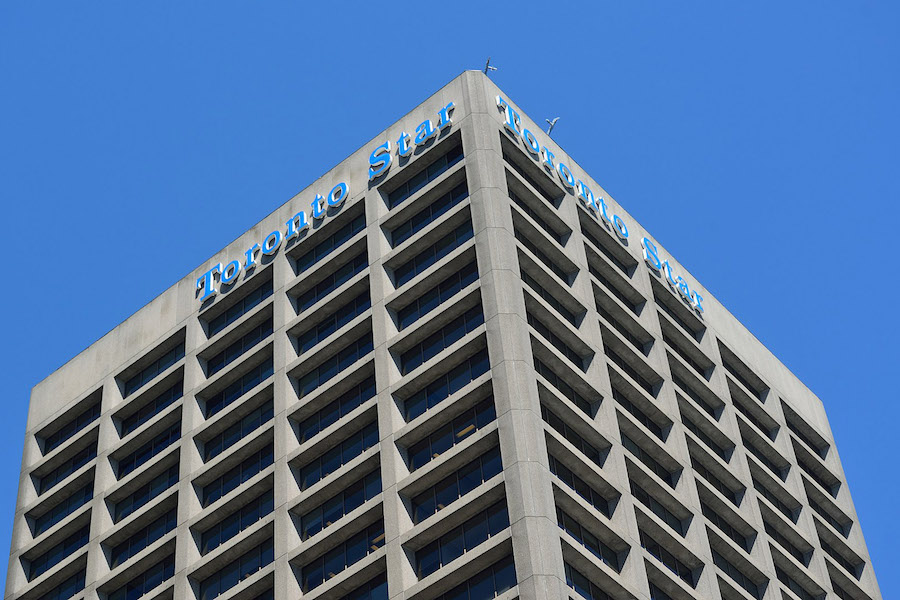
Three daily Toronto newspapers published blank front pages today as part of a campaign to pressure Ottawa to force Google and Facebook to pay journalists for aggregated news content.
The Toronto Star, Toronto Sun and the National Post ran blank pages on February 4 with text at the bottom that reads: “Imagine if the news wasn’t there.”
The lobby group News Media Canada, which represents Canadian newspaper, is behind the move. It has argued that news outlets are forced to accept unfair terms that threaten the financial viability of high-quality journalism amid growing demand from readers and viewers.
In a report released last September, the group said Google and Facebook form a duopoly that controls 60 to 90 per cent of the online digital advertising market, “which gives them market power to impose unfair and anticompetitive terms on news publishers.”
“Google controls the ‘ad tech stack’ to intermediate between ad buyers and sellers,” the report continues. “It dictates the prices and keeps the difference for itself through its control of the exchanges in advertising markets on both sides of the transaction.”
The report states that Canada should follow in the Australian government’s footsteps in attempting to pass a code that forces Google and Facebook to collectively negotiate payments directly with news outlets.
Since then, Google has threatened to pull its search engine from Australia and Facebook has threatened to withdraw its news feed for Australian users.
The U.S. government is also pressuring Australia to abandon the proposed legislation, which was introduced in December, and questioned whether allowing an arbiter to mandate payments to news outlets was in compliance with the Australia-United States Free Trade agreement.
News Media Canada estimates the Canadian sector would recover $620 million in annual revenues via collective bargaining with tech giants, adding that yearly revenue losses between 2019 and 2023 are projected to be between $500-$600 million.
Forcing tech companies to pay for aggregated content would also maintain the viability of 700 journalism jobs, the report adds, estimating there are about 3,100 print journalists working in Canada.
Canadian Heritage Minister Steven Guilbeault said in a statement to NOW that the federal government plans to put forward new legislation this year.
“We are currently studying options for a made-in-Canada formula that would ultimately lead to a comprehensive, coherent and equitable digital framework for both Canadian news publishers and digital platforms,” he said.
“News is not free and has never been,” Guilbeault said. “Our position is clear: publishers must be adequately compensated for their work and we will support them as they deliver essential information for the benefit of our democracy and the health and well-being of our communities.
He added that Canada plans to “address the market imbalance between news media organizations and those who benefit from their work.
“One-off initiatives, such as those proposed by digital platforms, won’t be enough,” he continued. “A more sustainable solution is required to protect our democracy while levelling the playing field for everyone. We’ve already had conversations with France and Australia in this regard and we follow the outcomes of their own initiatives with close attention. Our discussions continues with our partners around the world, as well as with relevant stakeholders, media groups, and experts and major digital companies.”
A rep for Facebook Canada responded to the blank front pages by saying the company sends free web traffic to Canadian news outlets that is worth millions and has invested over $10 million in the news industry here.
“This ad neglects to mention the value that free Facebook tools provide to publishers’ businesses,” said Facebook Canada’s Global Director and Head of Public Policy Kevin Chan in a statement to NOW. “This includes free distribution that sends people directly to their website, a value we estimate to be in the hundreds of millions of dollars per year in Canada alone. We want to help news organizations build sustainable business models. That’s why, in addition to free tools, we’ve also invested more than $10 million in the last four years in the Canadian news industry.“
Last fall, Google Canada called the News Media Canada report “unfounded.”
“News Media Canada released a report attacking Google for the decline of their business and demanding that we pay for the inclusion of news results in Google Search,” the company said in a blog post. “While we encourage the current discussion about how news can thrive in a digital world, there have been a number of assertions made by News Media Canada’s report which are either unfounded or incorrect.”
Google Canada spokesperson Lauren Skelly also tells NOW the company has launched the licensing program, Google News Showcase, which pays 450 publishers in a dozen countries, and sent more than five billion clicks to Canadian news sites “for free” in 2019.
The blank page campaign comes following lay off news at one of the country’s biggest media companies.
Earlier this week, the union representing Bell Media employees said the company laid off 100 workers connected to Toronto television newsrooms, plus more people outside the city, including at a Montreal radio station.
Update (February 4, 5 pm): This story was updated to include a statement from the Canadian Heritage Minister.












